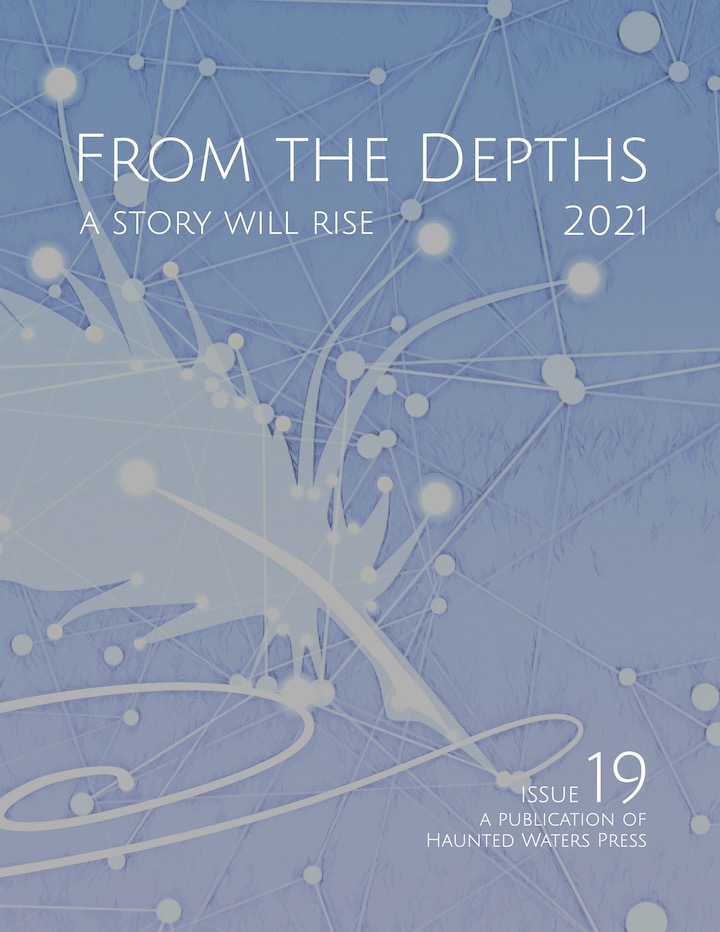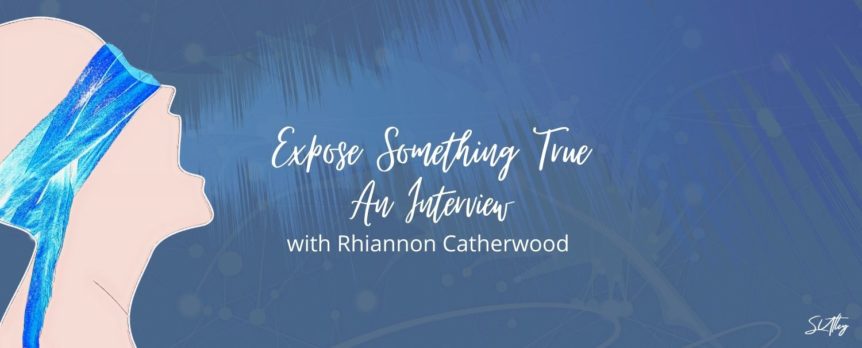Expose Something True
An Interview with Rhiannon Catherwood
Thank you for joining us for another Haunted Waters Press Featured Author Interview. In this series, we sit down with contributors to chat about their craft and explore the experiences that have shaped their writing.
Today's interview is with HWP Contributor Rhiannon Catherwood—recipient of the 2021 Haunted Waters Press Award for Fiction. Rhiannon's work The Creation of Echo is showcased in the 2021 issue of From the Depths and upcoming in Tin Can Literary Review, Volume Two. Look for it in SPLASH! later this year. Enjoy!
I developed an interest in story before I developed an interest in writing. When I was little, I analyzed cartoons for plot structure before I had the vocabulary to talk about it yet, and before I was able to write, I started making my own stories by animating on little note cards and flipping through them as I narrated the stories. Writing started in elementary school as adaptation, taking things like video games which (at the time at least) only had very simplistic narratives, and developing them into prose that now we would call fan fiction. I think what was driving me even then was the idea that the stories I was experiencing, whether reading or watching or playing them, made me feel powerful things, and I wanted to make other people feel powerful things.
What is your workday like as a writer?
It depends on the season. In the winters, I sleep late, wake up slow, and spend mornings playing with the cat. In the afternoon, I’ll find my way to the laptop and start re-reading what I’ve already written of a piece in progress and reviewing outlines to ease myself into a writing flow state, and then I’ll spend the evening hours trying to work through a few more pages. In the summers, my best writing happens on the road. I travel, sleeping in my car, so I tend to wake up at dawn and figure out my route for the day and where I’ll be sleeping next. I spend those days hiking or exploring, and I keep an app on my phone for audio recording thoughts during long hours on the highway. Somewhere along the way, I’ll find a café or a diner where I’ll spend a few hours planning and developing or progressing in the writing of whatever I’m working on. “The Creation of Echo” was written almost entirely in coffee shops in Colorado, Wyoming, and South Dakota.
I always say that good fiction should expose something true, and that’s both the joy and the challenge of it for me.
—Rhiannon Catherwood
Describe your editing process.
Constant and recursive. I am obsessive about language, so I tend to rework sentences and paragraphs over and over again after I’ve written them. I spend a lot of hours rereading and endlessly tweaking anything I’ve written. I rarely wind up doing a substantial rewrite, but every paragraph has probably been adjusted a dozen times. When I’m satisfied with it, the final step of my editing process is always the same – reading it out loud to my wife, (who thankfully prefers audiobooks anyway). No matter how many times I think I’ve polished something to perfection, reading it out loud will inevitably reveal issues in language or flow that I couldn’t find by just looking at the text.
You are currently seeking publication of your first novella. Tell us about that story and how it evolved.
The novella, “Mnemocin,” follows a woman named Clio with the telepathic ability to “step into” and observe others’ memories. As the plot moves forward, the focus shifts increasingly to her struggle with her own traumatic memories. This piece of fiction grows out of my experience with creative nonfiction—my belief in the importance of learning to navigate our own personal stories. The initial idea for a woman tasked with digging into and bringing to light other people’s histories likely came from my work as a creative nonfiction teacher, talking students through finding the meaningful stories in their messy memories. The novella’s evolution into a story about Clio’s own trauma may have more to do with my experience of surviving an abusive relationship and the slow process of coming to recognize it for what it was long after the fact.
Do you have any tips to give a writer who is trying to decide if their idea is right for a short story or if it is a longer format project?
For me, personally, I can only find out for sure how long something is going to be while I’m actually writing it. My advice is, rather than trying to decide if something is going to be a short story or a novella or a novel, just train yourself to be concise, no matter what kind of writing you’re doing. By concise, I don’t necessarily mean short – I mean sharp, focused, purposeful. Every sentence should be contributing in some way to character development, world-building, mood, plot advancement, aesthetics, or ideally a combination of those, and shouldn’t repeat unless the act of repetition itself is somehow part of the point. Whether you’re writing flash fiction or an 1,100-page epic fantasy, you can and should be concise. If you write concisely, you’ll find the correct length for your story.
What joys and challenges do you find in writing short fiction?
I always say that good fiction should expose something true, and that’s both the joy and the challenge of it for me. I’ve always viewed fiction writing as a kind of mythmaking—obviously in the case of “The Creation of Echo,” that gets pretty explicit. Any story that we get attached to influences our conception of ourselves and our experiences—even the simplest “just for fun” reading or viewing becomes part of our framework for understanding the world. It’s both exciting and difficult to express something true more powerfully than a factual narrative could.
Is there a particular piece of writing or an author you feel has influenced you most as a writer?
I’ve been influenced to some extent by every author I’ve ever enjoyed. When I write about transgender or queer experience, it’s possible my voice has a little of Jennifer Finney Boylan, Jamison Green, or Alison Bechdel in it, or for other memoir pieces, maybe Nick Flynn or Lauren Slater. When I write literary fiction, there might be a little Zadie Smith, Ali Smith, A.S. Byatt, or even Mark Z. Danielewski in there, and if I’m not careful, my dialogue can definitely get a little Aaron Sorkin meets Amy Sherman-Palladino – though all those voices are so different that to mash them together I’m not sure a reader would necessarily notice their traces. As for authors whose genres I don’t really work in but whose work I’ve gotten hung up on – Neil Gaiman, Emil Ferris, Alan Moore – for all I know, they’re in there someplace too.
How much of yourself do you allow to flow into your characters?
All of my protagonists are, to some extent, a little bit of me. I explained above about the way my experience as a teacher of creative nonfiction and as a survivor of domestic abuse shaped the character and plot of “Mnemocin.” In “The Creation of Echo,” it may have more to do with my experience as a transgender person, particularly during transition. Back then, I found myself unable to stop obsessively considering how I was perceived by friends, family, strangers, partners, feeling myself defined in a shifting, inconsistent way by every new set of eyes, struggling to see myself and define myself on my own terms. It may also have a bit to do with my experience of learning how to exist outside the context of a relationship, to be an individual person without having a partner to understand myself in relation to. Or who knows, with this obsession with being seen, maybe it’s just a Leo thing.
What is the best piece of writing advice you’ve been given?
To understand that while we may often write in solitude, writing is not actually a solitary act. At least professional writing isn’t. “Dear Diary” is one thing, but if you’re writing with the hope of publishing, writing is performance art, and it needs to be created with the audience in mind. How do you make the audience see what you see and feel what you feel? What effect do you want to have, and how can you get there?
If you could tell your younger writing self anything, what would it be?
In writing fiction and nonfiction, and in life for that matter, to drop the act and just start telling the truth.


Lightning Round with

ABOUT THE AUTHOR
Rhiannon Catherwood lives in Syracuse, NY, with her wife and cat. She is a teacher, circus artist, photographer, and road tripper. She has published memoir, travel writing, literary fiction, and discourse on everything from sperm banking as a trans woman to bartending in a Leia bikini at science fiction conventions. She believes that good fiction should expose truth and good creative nonfiction should be about creation.
Share this Post

